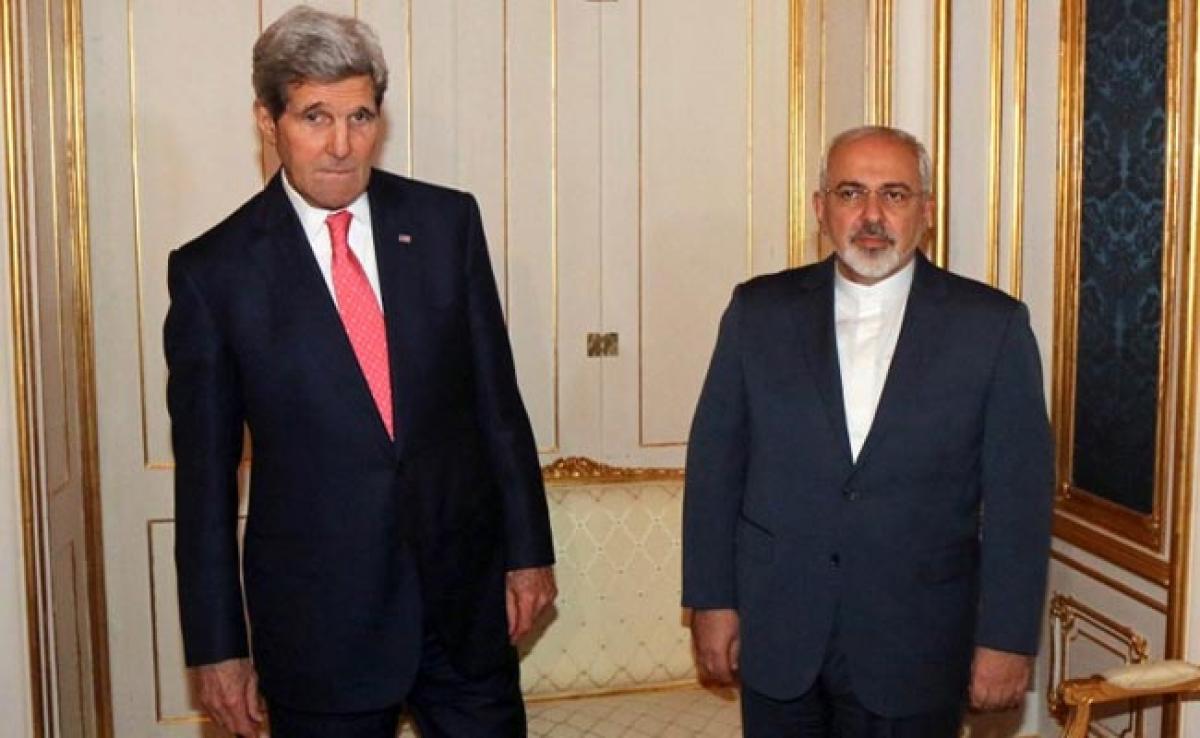Live
- ‘Get Set, Grow Summit 2024’ Focuses on Digital Detox for Families
- Stokes motivates his team to put in extra effort, says England pacer Potts
- From overcoming setbacks to leading India in U19 Women’s Asia Cup, Niki Prasad's amazing journey
- Driving Enterprise Security: Inside Venkata Reddy Thummala’s Leadership Journey
- Constitution debate: PM Modi hails 'Nari Shakti'; makes strong pitch for 'United Bharat’
- Abhijeet Bhardwaj: Revolutionizing Enterprise Analytics with Innovation and Expertise
- Bihar: Inquiry initiated against principal who went to buy veggies during school hours
- Press Sri Lankan Prez for release of Indian fishermen: TN Cong MP to EAM Jaishankar
- TN: DMK postpones executive meet due to heavy rains & Parliament session
- Porous silicon oxide electrodes can fix durability issues in batteries: Researchers
Just In

x
Highlights
Talks between Iran and the US enter a \"critical phase\" today with tensions rising just three days from a deadline to nail down a deal thwarting any Iranian nuclear arms drive.
Talks between Iran and the US enter a "critical phase" today with tensions rising just three days from a deadline to nail down a deal thwarting any Iranian nuclear arms drive.

EU foreign policy chief Federica Mogherini was due to arrive during the day after US Secretary of State John Kerry and his Iranian counterpart appeared to have made little headway when they returned to the negotiating table in Vienna on Saturday.
"Obviously we are at a critical stage now," a Western diplomat said. "It's become more tense in the final days. But that was always likely to happen."
Global powers known as the P5+1 group Britain, China, France, Germany, Russia and the United States are seeking to flesh out the final details of a historic accord to curtail Iran's nuclear programme.
They are seeking an accord by Tuesday's June 30 deadline, building on guidelines set by a framework deal agreed in Lausanne on April 2.
Kerry told reporters that although he remained "hopeful" there was still "a lot of hard work to do".
Iranian Foreign Minister Mohammad Javad Zarif agreed, saying negotiators "need to work really hard in order to be able to make progress and move forward".
But his deputy Abbas Araghchi suggested parts of the Lausanne framework no longer applied because other countries had changed their positions.
"In Lausanne we found solutions to many things, but some issues remained unresolved," he told an Arabic-language Iranian television channel Al-Alam.
"And now some of the solutions found in Lausanne no longer work, because after Lausanne certain countries within the P5+1 made declarations... and we see a change in their position which complicates the task."
Officials have acknowledged the June 30 deadline may slip by a few days, but several diplomats have categorically ruled out any further formal months-long extension of the talks which have dragged for almost two years now.
With diplomatic pressure growing, other ministers from Britain, China, Germany and Russia are due to follow Mogherini to Vienna over the coming days.
'Indispensable' conditions
French Foreign Minister Laurent Fabius, who flew in on Saturday, said at least three "indispensable" demands remained unresolved.
"We want a robust accord that recognises Iran's right to a civilian nuclear programme, but which guarantees that Iran renounces definitively nuclear weapons," he said.
Fabius, who met separately with both Zarif and Kerry, stressed there must be "a lasting limitation of Iran's nuclear capacities in research and production" as well as rigorous inspection of military sites, and a mechanism to quickly reimpose sanctions.
It is hoped a deal would end a standoff dating back to 2002 which has threatened to escalate into war and poisoned the Islamic republic's relations with the outside world.
But any deal must stand up to intense scrutiny by hardliners in Iran and the United States, as well as Iran's regional rivals Israel, widely assumed to have nuclear weapons itself, and Saudi Arabia.
According to the Lausanne framework, Iran will slash by more than two-thirds its uranium enrichment centrifuges, which can make fuel for nuclear power or the core of a nuclear bomb, and shrink its uranium stockpile by 98 percent.
Iran also agreed to change a planned reactor at Arak so it cannot produce weapons-grade plutonium and no longer to use its Fordo facility built into a mountain to protect it from attack for uranium enrichment.
In return it is seeking a lifting of a complicated web of EU, US and UN sanctions which have choked its economy and limited access to world oil markets.
But on Tuesday Iran's supreme leader, Ayatollah Ali Khamenei, set out key "red lines" for a final agreement that appeared to go against Lausanne.
These included the timing of sanctions relief and UN access to military bases, needed to investigate claims of past bomb-making efforts and to probe any future suspicious activity.

Next Story
More Stories
ADVERTISEMENT
© 2024 Hyderabad Media House Limited/The Hans India. All rights reserved. Powered by hocalwire.com







